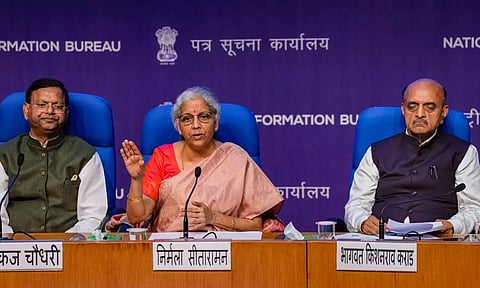

CHENNAI: The interim budget presented on Thursday by the finance minister Nirmala Sitharaman was different in several ways from the interim budget presented prior to the 2019 elections.
At that time, the Government was more tentative about achievements, a trifle unsure about the forthcoming polls, and therefore rolled out several promises and announcements. This was unusual in an interim budget. In contrast, the first point to note about the current budget is that the Government could look back on the achievements of the last ten years, enumerate all that it had achieved, and with some sense of satisfaction.
It clearly felt that new announcements were not called for, and that there was more than a reasonable hope that the voters would return them to power, and announcements could therefore wait for the main budget sometime in July/August. In addition, there was clearly some maturity in thinking that the new Government should decide its own priorities, and that the new road map should reflect the strategy of the new government.
Therefore, the budget speech devoted considerable time in talking about achievements, of the progress made under various programmes, and the initiatives that had been taken in the last ten years by this Government.
Two strands stood out. First, there was a focus on social justice and equality and opportunities for all, and the speech carefully highlighted the programmes that were focused on agriculture, farmers, rural women, self-help groups, housing for the poor, skilling programmes and the like. Second, there was little directed towards industry or the financial markets.
Perhaps the argument was that the ground had been prepared for capital formation in the private sector to take place, that infrastructure investments in roads, rail, ports, airports would lead to growth in economic activity and development. In that sense, the announcements focused on what the Government had done for the ordinary person, rather than for industry or the markets. Subtle, but clearly an election pitch.
Three announcements were new, and welcome. The first, the announcement of a major programme for household solar power generation. It has to be fleshed out, but can be a game changer if properly implemented. It will also create capacity for manufacture of equipment in the country, as well as a major employment opportunity.
Second, the announcement of 2 crore new houses — with a twist that it would focus on those living in rented houses and in slum areas as well as in unauthorised places. Clearly targeted to the urban, lower middle class and below, and likely to be a good scheme.
Third, and to me a very important idea, is the announcement of a corpus of one lakh crore to be given as a long-term loan with low/no interest for R&D in technology and new areas. This is something that the country has been direly in need of.
The cutting-edge programmes in space, electronics, medicine and pharma have suffered from lack of technical knowledge, expertise, and materials that can be sourced indigenously. This is a gap that has long been crying to be addressed. It needs to be followed through with targeted asks from the industry as well as Government, to focus research in directions that will be useful for the economy.
Last, the taxation and fiscal deficit numbers. In an interim budget, these are at best tentative, and need to be taken as such. And yet the borrowing numbers as well as the fiscal deficit itself, seems very large. We will have to see, in the regular budget.